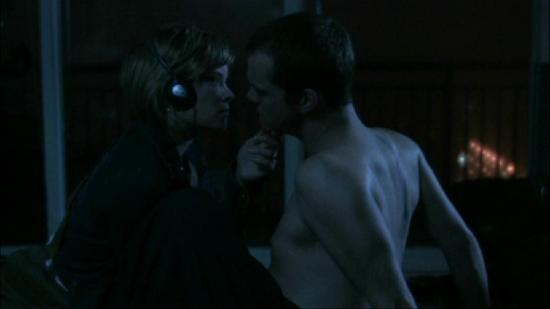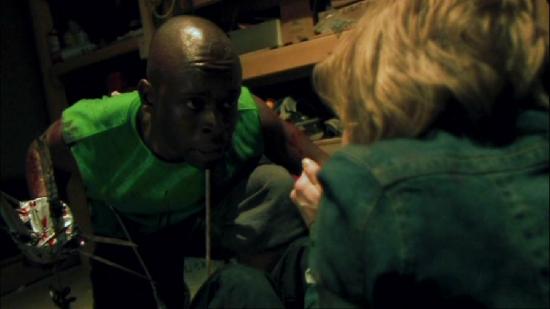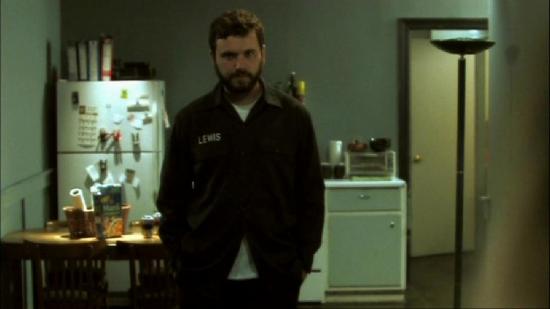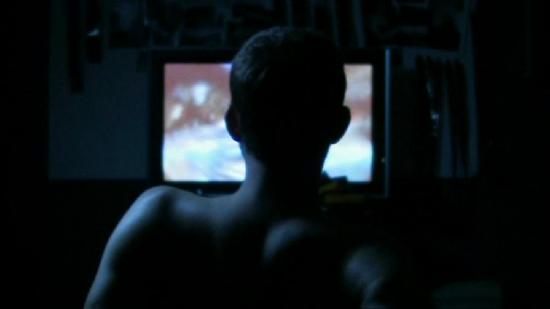The Signal
Introduction
Written, directed and edited by David Bruckner, Dan Bush and Jacob Gentry (also producing), The Signal is told in three parts - or 'transmissions', beginning in a bedroom in Terminus where a couple, Ben and Mya have just slept together on New Year's Eve. Getting up to go back to her abusive husband, Mya discovers that both her cell phone and the landline only emit a strange noise and the television has turned itself on, also broadcasting the same sound with a hypnotic visualisation.
People have become crazy, killing and maiming in a zombie-like state and her husband, Lewis, seems to be more aggressive than usual, before suddenly killing a friend with a baseball bat.
The signal is all pervasive, affecting just about everybody, so you don't know who you can trust, or even if what you see is real. The three transmissions show events through flashback and the way the signal has affected people, making them obsess over one thing, whether it's a New Year's party or, in Lewis' case, his wife.
Video
The picture is very dark and bleak, perfectly fitting the downbeat tone of the film and the odd scenes with bright colours seem completely incongruous. The violence and gore are very well presented, despite the low budget.
Audio
There's a choice of stereo or 5.1 surround and the latter is the way to go, with a very atmospheric and creepy soundtrack. The signal keeps appearing to keep you off balance and there are some well orchestrated jumps and scenes of high tension.
Extra Features
The commentary is done in an interesting way, with all three filmmakers involved, but during each segment the director is ejected so the other two can give a more objective viewpoint. This works quite well and they do provide some nuggets of information.
The featurettes comprise interviews, making of and behind the scenes footage and are fairly informative and interesting. Also included is the entire short film, The Hap Hapgood Story, which features at the beginning of The Signal, but in an edited and truncated version.
There is also the theatrical trailer, some deleted scenes and webisodes, which are well worth looking at.
Conclusion
The Signal begins like a 1970s exploitation slasher, but the picture gradually becomes more and more disturbed by flashes of bright colour and distorted noise until it cuts to a dark bedroom where the television has mysteriously turned itself on. There is no explanation given for what the signal is, where it comes from or how it works. All you know is what the characters know: that television sets and phones emit something that messes with their minds.
During the three transmissions the story develops from straight horror to something more complex, with the flashbacks adding to the opening sequence and, as you get to know the characters more, it turns into more of a psychological horror than a slasher film. It improves on repeated viewings, so it's a film that definitely has mileage and it isn't, as I feared it would be, disjointed with having three directors. It helps that the filmmakers worked closely together on each segment, with one directing, another filming and the third prepping the actors. Being young and inexperienced filmmakers, it probably helped that it was a collaborative effort and almost feels like it was made by one person.
The Signal is a really interesting horror film, similar to films like 28 Days Later and The Crazies, but using technology, rather than an unnamed virus or biological weapon as the source of 'the crazy'. There have been many Asian horror films using phones, computers and video as the source of evil, but this is very different to those. Recommended for genre fans.




Your Opinions and Comments
Be the first to post a comment!